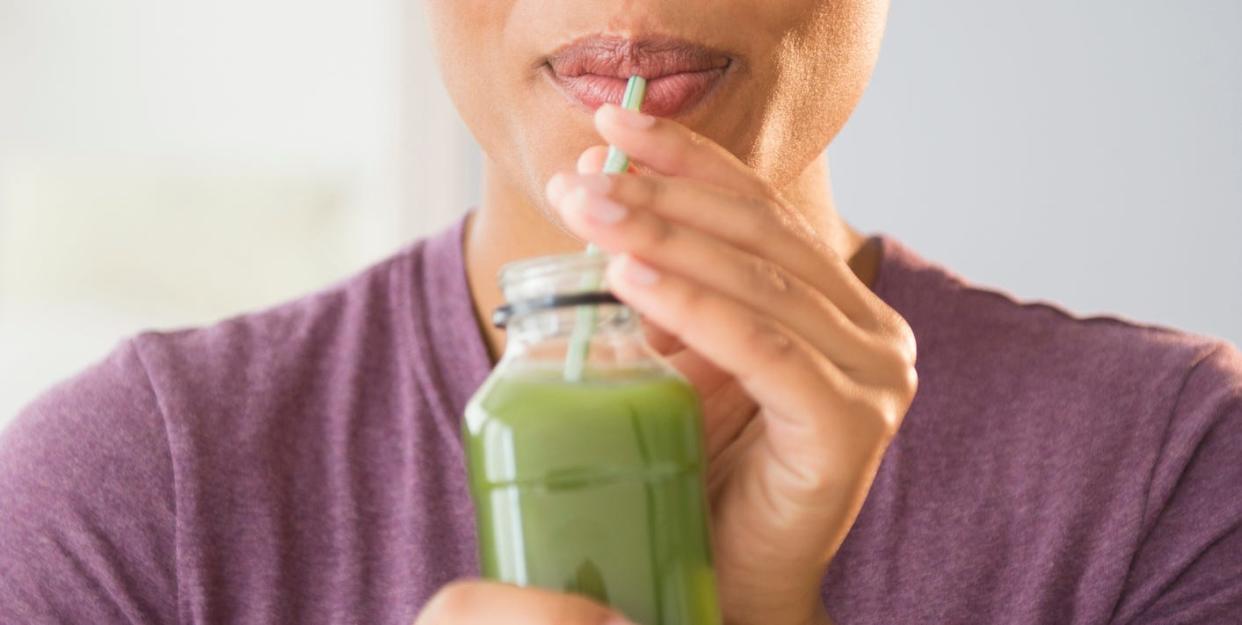Does Chlorophyll Water Really Have Enough Health Benefits to Be Worth It?

"Hearst Magazines and Yahoo may earn commission or revenue on some items through the links below."
If you follow wellness bloggers or have recently perused the beverage-to-go fridge in a grocery or convenience store, you’ve likely stumbled across chlorophyll “water.” Some versions claim to detoxify your body while others promise weight control. Also available in drop form, celebs are even jumping on the bandwagon. Kourtney Kardashian says chlorophyll water is an important key to her health routine. But is this elixir as good for you as proponents say it is?
Before you fork over your well-earned money hoping for a drink that will change your life, find out what doctors and a registered dietitian really think of it. Here, they explain what chlorophyll water and chlorophyll drops really are and what effects they can have on your body.
What is chlorophyll, exactly?
First, let’s take a step back to science class: In case you forgot, chlorophyll is a green pigment in plants that absorbs light to create food for the plant that it’s a part of. Today, tons of companies sell chlorophyll in the form of supplements, drops, or beverages for humans to ingest—all in the name of wellness. Chlorophyll “water” is usually just purified water that’s fortified with a mix of vitamins and other nutrients, including chlorophyll.
Unfortunately, Brynna Connor, M.D., healthcare ambassador at NorthWestPharmacy.com says that your store-bought chlorophyll water may not be the real deal. “It’s important to understand that the chlorophyll water you’re buying at the store probably doesn’t even contain natural chlorophyll,” she says. “Because chlorophyll is relatively unstable, most chlorophyll products like chlorophyll water actually contain a semi-synthetic mixture of sodium copper salts derived from chlorophyll called sodium copper chlorophyllin (SCC) or chlorophyllin copper complex.”
This means that any health benefits indicated by research done about natural chlorophyll shouldn’t automatically be assumed to be related to the semisynthetic sodium copper chlorophyllin you’re consuming via chlorophyll water.
So what does chlorophyll do for your body?
One small study found that when a powdered form of chlorophyll was mixed into meals, it curbed hunger in overweight women. Another study suggests that the derivative chlorophyllin in pill form can trap cancer-causing particles in the gut.
However, Dr. Connor says that the study that showed that consuming chlorophyll may help curb hunger researched the consumption of natural chlorophyll in the form of thylakoids in their study—not sodium copper chlorophyllin—which means that sadly the stuff you get from your grocer may not fit the bill.
And as for those cancer-trapping hopes, there’s more bad news. Research on chlorophyll in humans is very limited and research with rodents has had mixed results, so it’s really a gray area. On top of that, chlorophyll supplements are not regulated by the FDA so there is no guarantee of how much chlorophyll you’re getting in beverages, powders, or capsules—or how safe they are, says Liana Lianov, M.D., a member of the American College of Preventive Medicine and vice-chair of the American Board of Lifestyle Medicine Core Competencies medical education program.
What are the potential benefits of ingesting chlorophyll?
“People use it to address a number of problems, including acne, bad breath, gut health, lung cancer, pancreatitis, constipation, detoxification, and wound healing,” says Angel Planells, M.S., R.D.N., Seattle-based Registered Dietitian Nutritionist and national media spokesperson for the Academy of Nutrition and Dietetics. “The truth of the matter is that there isn’t enough information available to really know how chlorophyll might work in the human body.”
Are there any risks to consuming chlorophyll?
For the vast majority of the population, the only negative side effect might be potential gastrointestinal upset. “I would caution anyone pregnant or currently breastfeeding because there is not enough reliable information about the efficacy and safety of consuming it so better safe than sorry,” says Planells. “There are also some medications that may increase sensitivity to sunlight so be mindful if you are taking some like Avelox, Cipro, Elavil, Levaquin, and Tetracycline.” It's worth noting that tetracycline, doxycycline, and minocycline are frequently used by teenagers to combat acne—and they can all affect one’s photosensitivity (a.k.a. in this context, skin sensitivity to sunlight).
The bottom line: Should you drink chlorophyll water?
If you don’t mind spending the money and think it really does benefit you in some way, it’s fine to try chlorophyll drops or water—as long as you check with your doctor first. However, you’re probably better off drinking regular water to stay hydrated and eating more foods like spinach, collard and mustard greens, spirulina, broccoli, cabbage, asparagus, green beans, and peas—all of which are naturally rich in chlorophyll.
“There are plenty of well-documented health benefits of plants that contain chlorophyll like green vegetables. However, there is not enough evidence to support that chlorophyll (or sodium copper chlorophyllin) all on its own will provide even a fraction of those benefits,” says Dr. Connor.
The other benefit of eating those plants is that they also supply you with a variety of vitamins and minerals, says Planells. “It may sound boring to consume a well-balanced diet, but it is far more economical than spending money on liquid or supplemental chlorophyll,” he adds.
Unless you’re instructed by a doctor to take a supplement that does isolate one specific chemical like chlorophyll or chlorophyllin, it is almost always better to consume healthy foods as whole foods.
“Nature does a spectacular job of creating powerful health foods with a balance of many essential nutrients that are at their most effective when consumed all together,” says Dr. Connor.
You Might Also Like

